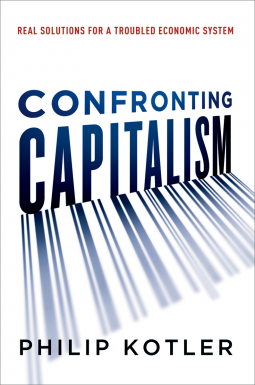
Confronting Capitalism
Real Solutions for a Troubled Economic System
by Philip Kotler
This title was previously available on NetGalley and is now archived.
Send NetGalley books directly to your Kindle or Kindle app
1
To read on a Kindle or Kindle app, please add kindle@netgalley.com as an approved email address to receive files in your Amazon account. Click here for step-by-step instructions.
2
Also find your Kindle email address within your Amazon account, and enter it here.
Pub Date Apr 15 2015 | Archive Date Jun 01 2015
AMACOM Books | AMACOM
Description
But trouble is cracking its shiny veneer. In the U.S., Europe, and Japan, economic growth has slowed down. Wealth is concentrated in the hands of a few; natural resources are exploited for short-term profit; and good jobs are hard to find.
With piercing clarity, Philip Kotler explains 14 major problems undermining capitalism, including persistent poverty, job creation in the face of automation, high debt burdens, the disproportionate influence of the wealthy on public policy, steep environmental costs, boom-bust economic cycles, and more.
Amidst its dire assessment of what's ailing us, Confronting Capitalism delivers a heartening message: We can turn things around. Movements toward shared prosperity and a higher purpose are reinvigorating companies large and small, while proposals abound on government policies that offer protections without stagnation. Kotler identifies the best ideas, linking private and public initiatives into a force for positive change.
Combining economic history, expert insight, business lessons, and recent data, this landmark book elucidates today's critical dilemmas and suggests solutions for returning to a healthier, more sustainable Capitalism—that works for all.
Available Editions
| EDITION | Hardcover |
| ISBN | 9780814436455 |
| PRICE | $26.00 (USD) |
Average rating from 7 members
Featured Reviews
 Joseph S, Reviewer
Joseph S, Reviewer
Confronting Capitalism: Real Solutions for a Troubled Economic System by Philip Kotler is a contemporary look at American Capitalism. Kotler studied at DePaul, earned his Masters from the University of Chicago and his Ph.D. in economics from MIT. He studied under three Nobel laureates: Milton Friedman, Paul Samuelson, Robert Solow. Kotler is currently the S. C. Johnson Distinguished Professor of International Marketing at the Kellogg School of Management at Northwestern University.
In earning my Masters in International Relations, I was required to take economics at the graduate level as well as going back to take the undergraduate courses to complete my degree. In my experience economics was dry and focused on theory rather than the effects -- the supply and demand curve rather than the real world effects of capitalism. In political science capitalism was just accepted as the only working system because we won the cold war. Communism was dead, even though it never really existed. Capitalism is the same. Ayn Rand called capitalism the unknown ideal believing that it was never truly tested. It was always interfered with by government. The result was two systems that never existed, in fact, but one claimed to be the winner.
The second problem with economics is that it is indeed very complex in the real world. However, many people’s understanding of it comes from sound bites on the news or political commentators. A few might even aspire to read Ayn Rand’s fiction, but almost no one has read Adam Smith all the way through or for that matter Marx. We live in a country, which in the world view, sees very little difference between our political parties, yet people call the two major parties socialist and capitalist/fascist. Our economic viewpoints wax and wane on how well the economy is doing at the moment.
Confronting Capitalism does something I have not seen before. It takes economics and puts it on a practical human scale. It discusses the things that the victor of the Cold War would rather not mention, the very real flaws of the system. Kolter brings to the table fourteen of these problems. They include the boom-bust cycles, damage to the environment and limited natural resources, persistent poverty, personal debt burden, unemployment caused by automation, the influence of wealth on government, and the growing concentration of wealth into the hands of the few. These are all real aspects of economics that affect the common person.
Kolter in plain words and clarity explains what is ailing our system. It is not an attack on capitalism but something more like a doctor’s visit. Much like a doctor examining an overweight smoker, Kolter does not condemn the system but rather points out the problems and offers serious solutions -- quit smoking, eat healthier, exercise so you can become stronger and live longer. Kolter keeps his attention on practical matters. Instead of awarding CEO’s bonus for yearly gains, focus on long term growth. Short term growth creates an unstable system that works on cutting workers, quality, and what ever else that can increase short term profit. He gives examples of other companies that focus on the long term and still make profits.
Confronting Capitalism also looks to balance. Unrestricted capitalism is much like Rand’s Unknown Ideal, unknown. What we fail to recognize is that the government has been involved in the economy since the beginning of the country. One of the first major issues with our new country was the Whisky Rebellion -- taxes. We like to think the West was settled solely with rugged individualism, but it was the government that granted tracts of land to the railroads which opened the West. Eisenhower used the federal government to create the interstate highway system. Between the two of those systems most of our industry and consumer goods flow. The government has always been involved in the economy.
Kolter gives a centrist view on capitalism. He presents what is right and what is wrong with the current system. What separates Confronting Capitalism from other economics books is the author’s style and method. Kolter is very clear and concise in his writing and writes so that he is understood by the general public. It is economics for the masses, but without any dumbing down. What Carl Sagan and Stephen Hawkings did and do for science Kolter does for economics. It is this type of clear thinking that is needed to get American’s to understand economics as a system and not an isolated issue. An outstanding read.
also posted on Goodreads. Will be posted on commercial websites when published.
 John G, Reviewer
John G, Reviewer
The U.S. economy is increasingly run by a “visible hand” instead of Adam Smith’s “invisible hand.” Large sectors of the economy are guided by a few powerful companies. The question is whether the visible hand runs these sectors with Smith’s “enlightened self-interest” or with just “self-interest”, according to Philip Kotler in his book Confronting Capitalism: Real Solutions for a Troubled Economic System.
The book enumerates fourteen different problems which the author sees with capitalism, ranging from increasing income inequality and persistent poverty to the dangers of narrow self-interest and the ways in which politics subverts economics. The identification of the fourteen issues is largely uncontroversial, although some might categorise them differently or combine some together. It is the author’s prescriptions for change which are likely to be wildly controversial.
It seems ironic that capitalism, as a system apparently built essentially by neglect as each person pursues his or her own interests in a rational manner, should be the subject of passionately held beliefs raising it almost to the level of a religion. I suspect that, by proposing a number of solutions which interfere with the sacred tenets of the free market, the author will be calling down on his head the wrath of the devotees of laissez-faire.
Readers who have little or no knowledge of economics and how capitalism works will find this book helpful if they keep in mind that many of the author’s simple-sounding solutions are highly controversial and unlikely to be adopted by any government which relies on support from wealthy citizens.
 Greg A, Reviewer
Greg A, Reviewer
Confronting Capitalism brings a fresh perspective on what capitalism is and how different variations of it are in existence in the world today. It provides an overview of what the subject is about so readers who are not acquainted much with the subject will be able to understand what is being discussed. This is followed by 14 chapters which correspond to the problems with this economic system and proposed solutions for each problem.
One of the things that I like in this book is the simplicity in writing employed by the author. I was expecting that it would include several concepts written in a way that only those who have PhDs in economics would understand. Fortunately, this book is written like the author is speaking to a friend who is just curious to know about this prevailing economic system.
Moreover, each chapter includes the proposed solutions for the different economic pitfalls provided in the book. The solutions are meant to stir thinking rather than a compilation of quick fixes. The problems of capitalism are not simple and therefore require delicate balance on whatever approach are taken to solve it.
On the other hand, I can say that this book is not entirely neutral. When you read this book, you also see the biases of the author towards several issues. However, I can say that the author provided justice by explaining both sides of the issues as much as possible. You may never agree on some of his view points as I don't agree with some but certainly this book will make you think about the issues.
As far as to whom I would recommend this book, I would say that politicians, businessmen, entrepreneurs, lobbyists, and others who have an interest in the way our economic system works should buy and read this book.
Overall, this is a great read. The book tackles multiple issues with such conciseness that I would very much want to dig deeper and read more books about the issues provided.
Readers who liked this book also liked:
John Kotter; Holger Rathgeber
Business, Leadership, Finance, Nonfiction (Adult)







